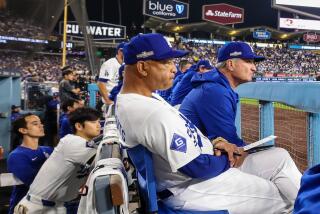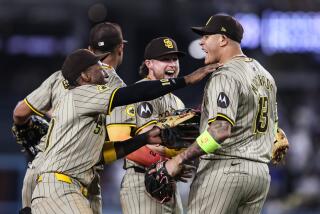Braves Doomed by Failure to Communicate
ATLANTA — Here is how a third base coach makes a living: (1) He tells batters when to bunt. (2) He tells batters when to swing. (3) He tells runners when to run. Otherwise, a coach’s only purpose on a baseball field is to scoop up discarded helmets, dodge foul balls and be a cheerleader.
The third base coach of the Atlanta Braves stood by idly Monday while: (1) A batter missed the sign on a suicide-squeeze bunt. (2) A batter took a called strike three in the ninth inning. (3) A runner kept running toward home plate without first obeying the mandatory procedure of stepping on third base.
The featherheaded Braves, as a result, were made to endure a one-run defeat, stranding them one additional defeat from missing the World Series.
This was a wonderfully suspenseful game of baseball, Monday’s was, chock-full of the understandable and forgivable human error that makes a good game great. Rare is the championship series that produces two scores of 1-0--in soccer, maybe, but not baseball--and rarer still is the game decided by a baserunner having neglected to touch all the bases.
How rare?
Atlanta’s third base coach, Jimy Williams, jiggled his jowls in sorrow and answered: “How rare is meat?”
A third base coach is a signalman, commissioned to communicate with baseball players by voice and semaphore, responsible for these players knowing what to do and when to do it. The accountability, therefore, of Jimy Williams for Atlanta’s 1-0 defeat by Pittsburgh in Game 5 of the National League playoffs cannot be objectively avoided.
Yes, it was Tom Glavine who missed the bunt sign, David Justice who froze on strike three, Justice again who was out for failing to set foot on third base. They, too, are at fault. But it was Williams who spent much of the afternoon missing more than just an m in his first name. Third base is his authority, and Justice overstepped it.
Before that, Williams missed a chance to confirm that Glavine, with the bases loaded in the second inning, had understood his command to bunt. Glavine struck out into a double play, and later said he had never acknowledged any order to bunt because Atlanta has no such signal.
“Some teams have that (ability to answer a coach), some teams don’t,” Glavine said. “We’re one of the ones that don’t.”
Another signal that Williams could certainly use is one to advise his hitters to swing the bat. He can instruct them to take pitches, sure, but apparently all the coach can do is presume that a dangerous cleanup hitter such as Justice will not stand there with the tomahawk on his shoulder, in the biggest game of the season, in both the first and ninth innings.
Roger Kahn once wrote of Duke Snider that the outfielder’s lingering reputation among many of his Dodger teammates was that he always looked relieved to draw a walk. The hitting of a speeding baseball, to quote another great outfielder of yore, Ted Williams, might very well be the most difficult thing to do in sports, but very little can excuse Justice’s looking at strike three from Roger Mason in the ninth inning of a 1-0 game.
No coach, in the 167th game of the season, should feel responsible for reminding a hitter to take a rip at any pitch within a foot of the strike zone, but just the same, Jimy Williams might have taken a moment to call Justice aside, or at least to shout out advice to be up there swinging at anything close.
Both men felt far worse about the fourth-inning fiasco at third base.
Rounding third and headed for home on Mark Lemke’s two-out single to left field, Justice sidestepped Pirate third baseman Steve Buechele, who occupied the hole through which Lemke’s hit passed. Unable to veer and approach third base from behind, so that he could step on the bag with his left foot, Justice ran in a diametrically straight line, stumbled like Chevy Chase and either did or did not brush the base with the sole of his shoe.
Williams watched him continue toward home plate and did not call him back. The coach said he was too preoccupied with all the various activity of the play to ascertain definitively whether Justice’s shoe made contact with the base, and, of course, the runner overstepping it was the last thing in the world the coach was expecting.
“I did not see him step on it, no,” Williams said. “At that moment, I’m not zoned in 100% on whether the runner hits the bag because I’ve got other things going on. I’m watching the outfielder pick up the ball. I’m watching the plate. I can’t see everything. The umpire’s got one job there--to see if the runner steps on the base. That’s all he’s got to do in that situation. David said he ‘skimmed’ the bag, or whatever. I’m just not sure.”
Was his initial thought, at least, that Justice had missed the bag?
“Yes,” Williams said.
Because he didn’t play it safe, the runner was out. Jay Bell, the Pirate shortstop, immediately began yelping that Justice missed the bag. Umpire Frank Pulli saw the play the same way. And Buechele, the third baseman, said afterward that Justice must have been guilty, having raised so little objection.
Not so.
“It does no good, so why protest?” Justice asked. “What’s he going to do--change his call? Even if I run out there, all I can do is be ejected. And what good does that do anybody?
“All I can tell you is, I felt my spikes scrape the bag. It was just awkward, that’s all. I’d like to see a replay of it because I know it looked funny. It might have looked like I missed it, even in the replay, but I know for sure that I hit that bag. I don’t blame the umpire. I don’t blame myself. I don’t blame anybody.”
He could.
More to Read
Go beyond the scoreboard
Get the latest on L.A.'s teams in the daily Sports Report newsletter.
You may occasionally receive promotional content from the Los Angeles Times.










